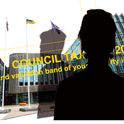East London has a rich political history of radicalism. In the 19th century, women employed at the Bryant and May match factory in Bow went on strike and marched on the Houses of Parliament to oppose a new tax, leading to the formation of the Union of Women Matchmakers. In the early 20th century, the East London Federation of the Suffragettes opened its headquarters in Bow, and George Lansbury, mayor of Poplar, and later an MP and leader of the Labour party, went to prison with 29 local councillors after they decided to use monies raised for London County Council on supporting their poorest residents instead.
In the 1920s, authorities were responsible for raising revenue for poor relief locally, but this penalised the most disadvantaged authorities, such as Poplar. These councils raised less because their local population was less wealthy. Lansbury and his colleagues fought for a fairer distribution of revenue across London and the government subsequently introduced legislation to establish the principle.
In the 1930s, tens of thousands of people took on Oswald Mosley and his British Union of Fascists in the infamous Battle of Cable Street (the estimated number of participants varies from 100,000 to 310,000). And in the 1940s the long-standing MP for Limehouse, Clement Attlee, became prime minister.
Fast-forward a century and east London is no longer a centre of political leadership. Instead it is a hotbed of political impropriety and incompetence. The mayor of Tower Hamlets, Lutfur Rahman, is a case in point. During his first stint as mayor from 2010 to 2015, Rahman was found guilty of electoral fraud for “making false statements”, “undue spiritual influence” and “bribery” after distributing millions in grants to political allies. A separate 200-page review from consulting firm PwC came to a similar view, finding that funding applications from community groups were approved by the council despite many of them being ineligible or failing to meet thresholds set by the local authority. Not long after Rahman was re-elected as mayor in 2022—after being banned from holding office for five years—the government said it had significant cause for concern and was “monitoring” the situation in Tower Hamlets.
Rahman has since been accused of promoting a “two council” culture split between corporate leaders and the acolytes in his private office, which is “detrimental” to the delivery of services and is “impacting on the reputation of the organisation”. In a sign of Whitehall’s concern, the government has since imposed an external inspection on the authority after Rahman was accused of “replicating the circumstances” from his first term that led to his dismissal, including appointing his former election agent Alibor Choudhury, who, in a 200-page judgment in a 2015 legal challenge to the 22nd May 2014 election for the Tower Hamlets mayoralty, was described as Rahman’s “hatchet-man” who did the “dirty work”. On Tuesday, the government published the scathing results of the inspection into the management of the council, which described a “culture of patronage” and a “lack of trust” that was rampant at the authority. As a consequence, Whitehall will appoint an envoy to oversee the management of Tower Hamlets.
Further east, in the borough of Newham, the local authority is now predicting that it could go bankrupt. The local mayor, Rokhsana Fiaz, cites the council’s temporary accommodation bill as the cause, but the authority has been equally poorly governed. A Freedom of Information request by the Covert Councillor can reveal that since April 2020, the authority has spent more than £1m on 34 non-disclosure agreements. It follows reports of significant infighting—and indeed alleged bullying—between the mayor and her political colleagues.
In Barking & Dagenham, meanwhile, opposition to the long-standing leader of the council, Darren Rodwell (known locally as “Dagenham Darren”), has created friction. Rodwell attracted media attention for a litany of controversial activities. Last year, his campaign banner was photographed attached to gravestones (he said he “wasn’t being disrespectful” and that his team was in the process of displaying the banner appropriately). In 2022, he told a podcast how he had chased two men who attacked his home with a baseball bat. And, according to his register of “gifts and hospitalities”—which all councillors are required to publish online—he is said to have accepted over £10,000 in football tickets from a film production company looking to set up studio spaces in the borough. Rodwell has now resigned. He denies any conflict of interest, and maintains that he has not breached the council’s code of conduct.
In Redbridge, meanwhile, new MP (and council leader until the 4th July election) Jas Athwal has been under the microscope for being the largest landlord in parliament and allegedly renting out sub-standard properties, leading some to call him a “slum landlord”. One tenant suffered from an ant infestation, while Athwal rented out another property to a failing care home for children. Athwal apologised following the accusations of sub-standard rentals, and denied knowledge of the failing care home allegedly using his property.
Even further east, in Havering, Conservative councillor David Taylor publicly accused his colleagues in June of “some of the most vile and toxic” politics he’d come across, of “pathetic bullying” and of carrying “personal vendettas”. Is Taylor’s portrayal fair? The authority’s refusal to disclose a 400-page assessment as part of a Race Equality, Accessibility, Diversity, and Inclusion review might be an indication. According to Havering council, publication of the document “risks fracturing community cohesion in the borough at a time when the national temperature is heightened”. It’s hardly a ringing endorsement.
And that other H—Hackney—has had a change of leadership: the borough has elected a new mayor after the resignation of Philip Glanville over a photo which emerged of him with an ex-councillor who was under criminal investigation for suspected child abuse imagery offences. And in what the Times has dubbed the “second paedophile scandal” for the borough, councillor Lee Laudat-Scott resigned in July after he was accused of “intentionally touching” a boy under 13. Laudat-Scott was on Hackney’s Children and Young People’s Scrutiny Commission as a councillor.
The local political class of east London today is clearly poor compared with the area’s storied history. There’s no longer a George Lansbury or Clement Attlee. What’s worse, while parts of east London undergo a divisive gentrification, which benefits the wealthy, this part of the capital remains home to some of the most deprived parts of England. These boroughs have high rates of poor health outcomes, sub-standard housing and poverty. The new Labour government has a responsibility to save east London’s taxpayers from the failures of local councils, and its deprived residents from the cruel fate of being subject to political incompetence. The steps being taken in Tower Hamlets are a start.












